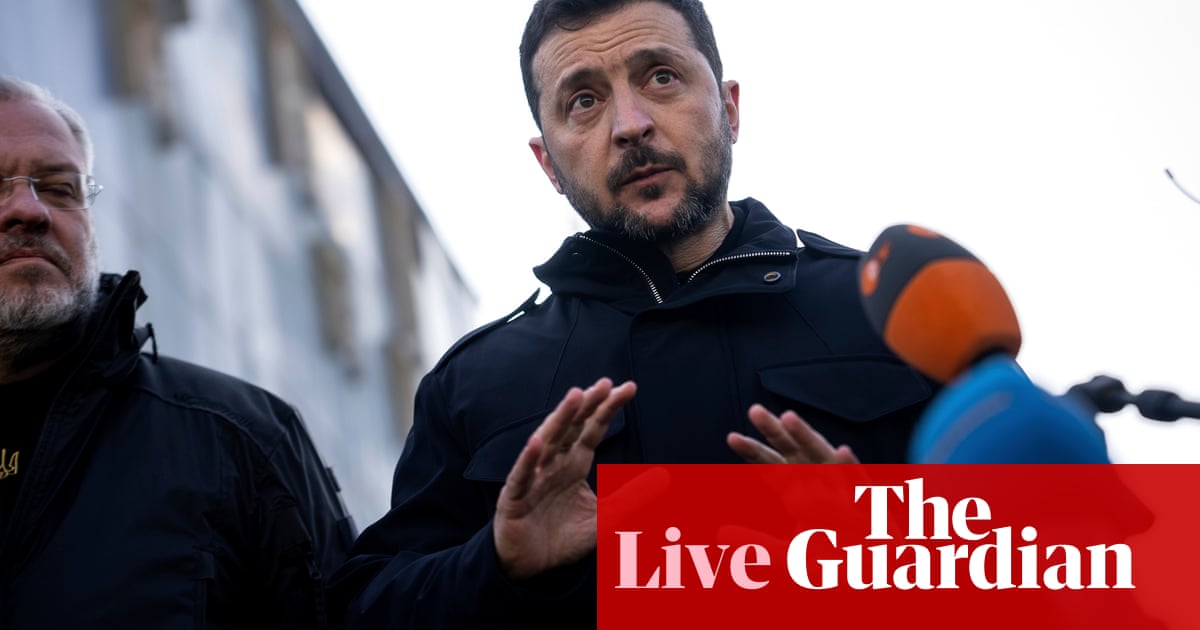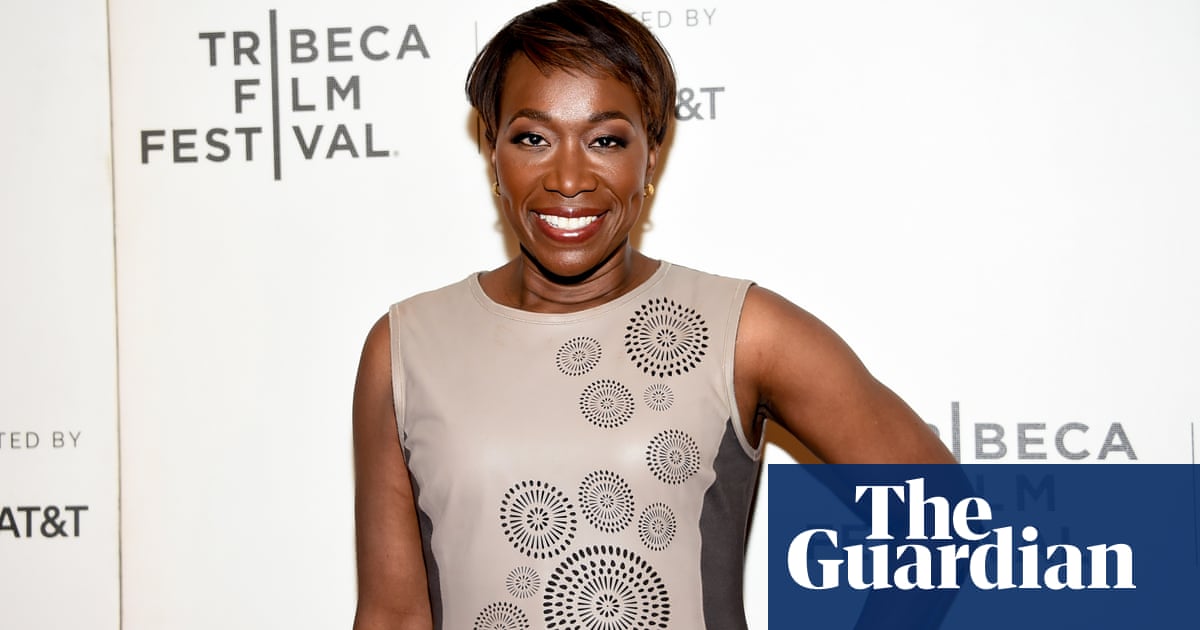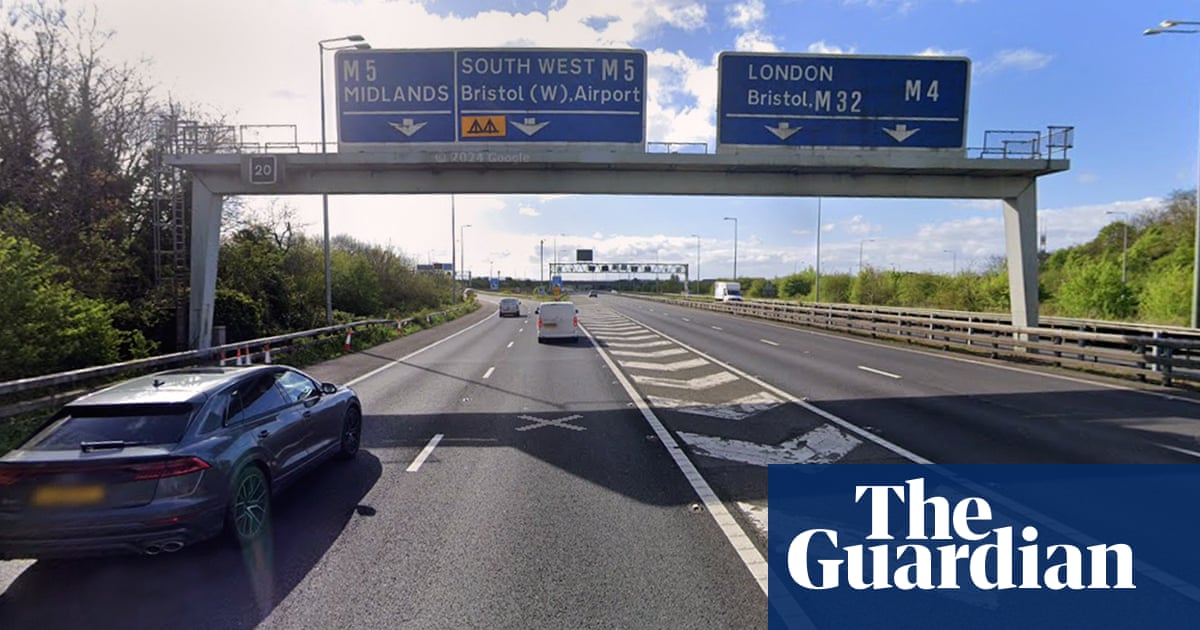France’s Macron warns against ‘capitulation’ to Russia’s demands on Ukraine

French president Emmanuel Macron has warned against a peace deal over the Ukraine war that would amount to “capitulation” as Donald Trump suggested Russia might not make any concessions in negotiations.
He said only the Ukrainian president, Volodymyr Zelenskyy, could negotiate on behalf of his country with Russia to end the war, warning in an interview with the Financial Times that a “peace that is a capitulation” would be “bad news for everyone”, including the US.
His voice joins a growing chorus of European leaders concerned about the proposed format of the peace talks proposed by US president Donald Trump.
Key events
And Reuters is just reporting that the Zelenskyy-Vance meeting has now been postponed to 5pm CET (4pm GMT), according to a source in the Ukrainian delegation.
Details on Zelenskyy’s meetings with US leaders
I earlier mentioned various behind-the-scenes meetings that are expected to take place at the Munich Security Conference today.
Our diplomatic editor Patrick Wintour has this latest update on meetings between the US and Ukraine:
The US vice-president, JD Vance, will face calls for greater consultation and coherence when he meets European leaders, including the president of Ukraine, at a security conference in Munich.
The timing of Volodymyr Zelenskyy’s meeting with US officials, initially scheduled for Friday morning, remained unclear because the US secretary of state, Marco Rubio, had to change his flight from Washington when the plane experienced a mechanical fault.
EU accuses Trump’s US of undermining free trade rules, says it would respond ‘firmly’
The European Union has just responded to Donald Trump’s other overnight announcement on reciprocal trade policy and tariffs.
In a fighting statement, the bloc called the move “a step in the wrong direction” and said that it “sees no justification for increased US tariffs on its exports.”
Tariffs are taxes. By imposing tariffs, the US is taxing its own citizens, raising costs for business, stifling growth and fuelling inflation. Tariffs heighten economic uncertainty and disrupt the efficiency and integration of global markets.
The statement says that the bloc has worked for decades with like-minded countries to “reduce tariffs and other trade barriers worldwide,” which it notes are “commitments that the US is now undermining.”
And it hinted at a firm response coming further down the tracks:
The EU will react firmly and immediately against unjustified barriers to free and fair trade, including when tariffs are used to challenge legal and non-discriminatory policies.
The EU will always protect European businesses, workers, and consumers from unjustified tariff measures.
Here’s the statement in full.
Trump’s ‘America first’ stance sold out Ukraine – analysis

Andrew Roth
Global affairs correspondent in Washington DC
In Donald Trump’s world, everything has its price.
There is no place for sentiment in his politics. Common values cannot secure loans for military aid. And the US president does not care who controls the blood-soaked soils of east Ukraine, so long as he can access the rare earth minerals that lie beneath.
The peace Trump will negotiate is not about justice. There is no deeper moral or morality here except for who “got it done”, and Trump has signaled that he is ready to pressure Ukraine and Europe to provide concessions to entice Russia to sign on the dotted line.
All that’s left for him is to hash out a price.
European reactions to US Hegseth’s comments on Ukraine – analysis

Dan Sabbagh
Defence and security editor
European leaders are reeling from several abrupt US moves since Wednesday in relation to the Ukraine war and the continent’s security, which has been underpinned by the US since Nato was formed at the end of the second world war.
The Kremlin welcomed the developments on Ukraine, but the statements prompted a sharp push back from European politicians in public and private at the Nato meeting, who voiced concern that too much had been conceded by the US already and that Ukraine and Europe were at risk of being excluded from discussions.
Those present at the Nato talks on Thursday said US defence secretary Pete Hegseth had come under pressure from “a chorus of voices” to ensure Ukraine was properly represented in the peace discussions – while a day earlier at a Ukraine-related meeting he was told not to halt all US military aid to Ukraine.
France’s Macron warns against ‘capitulation’ to Russia’s demands on Ukraine
French president Emmanuel Macron has warned against a peace deal over the Ukraine war that would amount to “capitulation” as Donald Trump suggested Russia might not make any concessions in negotiations.
He said only the Ukrainian president, Volodymyr Zelenskyy, could negotiate on behalf of his country with Russia to end the war, warning in an interview with the Financial Times that a “peace that is a capitulation” would be “bad news for everyone”, including the US.
His voice joins a growing chorus of European leaders concerned about the proposed format of the peace talks proposed by US president Donald Trump.
Update from Munich on suspected car ramming attack
We are also expecting an update from the Munich police this morning, after the number of people injured in yesterday’s suspected car attack has gone up to 30.
But, but, but there was also an important correction from the authorities that, despite what they said earlier, the suspect was in Germany legally.
Shortly after the suspected attack, Bavaria’s interior minister Joachim Herrmann suggested that the suspect’s asylum application was rejected, and that he was known to the police in connection with shoplifting and drug offences.
But he corrected the record on Thursday night, saying that the 24-year-old was, in fact, legally after he was given a residence permit in late 2021, even after his original asylum application was rejected.
Herrmann also said that his involvement with drug and shoplifting offences was in relation to his work as a security guard in a store. Or, as confirmed by the Munich police, he was simply listed as a witness, not as a suspect.
German president Frank-Walter Steinmeier is due to visit the scene this morning, and a police briefing is expected around 11am CET (10am GMT).
The suspect is also expected to be brought in front of a judge today, so we may hear more there.
The day ahead

Jakub Krupa
It’s going to be a busy, and potentially turbulent, day. Buckle up.
At the Munich Security Conference, we are going to hear from:
-
European Commission president Ursula von der Leyen
-
US vice-president JD Vance
-
Ukrainian president Volodymyr Zelenskyy
-
German president Frank-Walter Steinmeier
-
Multiple defence and foreign ministers of EU countries
Separately, US defence secretary Pete Hegseth is in Poland, which he called “a model” for how Nato should invest in its defence capabilities, and he will speak there twice during the day.
I will bring you all the key lines here.
Morning opening: We have seen it before

Jakub Krupa
In 1938, the UK, the French Republic, fascist Italy, and Nazi Germany signed an agreement that was meant to appease Adolf Hitler’s growing appetite for territorial expansion by allowing for the annexation of parts of Czechoslovakia (which was not represented). Guess how that worked out.
It was formally called “the Munich agreement,” although if you ask the Czechs and the Slovaks, they have a different name for it: “The Munich betrayal.”
The agreement was signed in the Führerbau building in Munich, approximately 950 metres from where today’s Security Conference takes place.
Just saying.
Given that historical background, it is only understandable that confronted with the prospect of Trump’s peace talks on Ukraine with Russia’s Vladimir Putin, this time happening behind their backs and with no clear guarantees about the role and the importance of Ukraine’s position in all of this, many European leaders feel deeply uneasy.
EU foreign policy chief and former Estonian prime minister, Kaja Kallas, was clear with how she saw Trump’s plan to decide the future of Ukraine in talks with Russia, potentially without the involvement of Europeans.
“Why are we giving them [Russia] everything that they want even before the negotiations have been started?” she said. “It’s appeasement. It has never worked.”
UK defence secretary John Healey, who played a central role in talks this week leading Europe’s push back against the new American policy, also repeatedly said: “No negotiations about Ukraine without Ukraine.”
Polish foreign minister Radosław Sikorski put it even more bluntly: “I’m going to Munich, but we’re not doing another Munich.”
Among other speeches, we will hear from US vice-president JD Vance. We know from his Paris appearance earlier this week that he does not mince words when he is unhappy about something.
German opposition leader Friedrich Merz claimed last night that he had some early briefing on what is going to be in Vance’s speech, and said he expected “a brutally hard message” and a “confrontational speech”.
Let’s see.
Crucial talks will be happening behind the scenes, including – seemingly in two separate channels – discussions between Ukraine and US, and between US and Russia.
I will bring you the latest here.
It’s Friday, 14 February 2025, and this is Europe live. It’s Jakub Krupa here.
Good morning.
Article by:Source: Jakub Krupa










